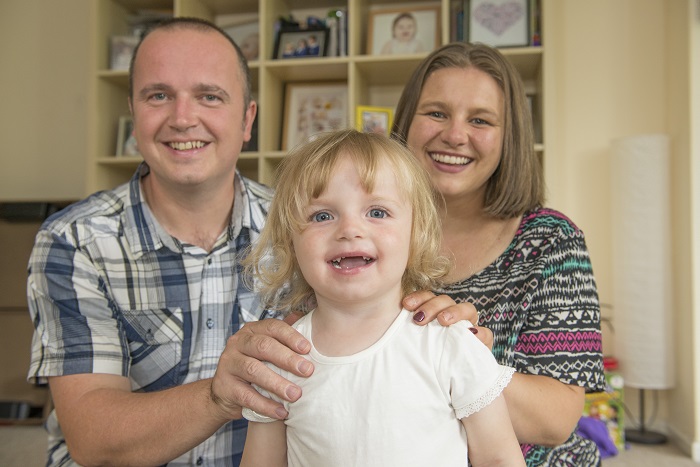
Parents who want to understand the cause of their infant daughter’s immune deficiency are among more than 1,000 people who participated in the first full year of a ground-breaking NHS genetics project in Oxford.
Kevin and Corinne Kirk hope a simple blood sample from daughter Evie, two, could help unlock the mysteries of her condition, which leaves her susceptible to infections and means she has to take antibiotics and a regular infusion of antibodies.
The Chinnor, Oxfordshire couple are among more than 1,000 patients and their families who have contributed to the 100,000 Genomes Project, a national project funded by the Department of Health.
Eligible patients with rare diseases and cancers are being invited to provide health data and blood and tissue samples for whole genome sequencing, where a complete set of a person’s genes is decoded to look for genetic mutations.
This will allow researchers to compare results from thousands of different people to develop new tests and treatments and, in some cases, provide better diagnosis and treatment for those who give samples.
The project’s central laboratory is the Oxford Molecular Diagnostics Centre at the John Radcliffe Hospital, supported by the NIHR Oxford Biomedical Research Centre.
Corinne said: “We got involved in the project to try and find out which immunodeficiency Evie has and how this happened to our daughter.
“If we can pinpoint which gene is affected the doctors will be able to better predict what this will mean for Evie’s future, from the risks involved in having her own children to whether this will mean she is more at risk from developing more serious diseases or cancers.”
Kevin said: “Evie’s symptoms presented themselves in contracting regular viral infections from tonsillitis to chest infections and, because of the rarity of the condition, local GPs and the hospital doctors were unable to answer why she kept getting ill.
“Our hope is that this project will help doctors to better understand the symptoms and that, in the future, medical science will be able to develop better ways of managing the problem or even eradicating it all together.”
Evie has a combined immunodeficiency which is a form of primary immune deficiency. This requires her to take two antibiotics as well as an antibody infusion from over 1,000 donors that acts as her immune system and is applied under the skin through a butterfly needle.
The 100,000 Genomes Project is for more than 190 rare diseases and breast, bowel, ovarian, prostate, lung, renal, bladder, endometrial and sarcoma cancers. Family samples are studied to understand how genes are inherited.
Consultants are asking patients and their families if they wish to take part and patients can also ask their consultant about getting involved. All participants must give written consent.
Evie’s consultant Dr Smita Patel, a consultant immunologist at the John Radcliffe Hospital, Oxford, said: “At present we recognise almost 300 genetic causes of primary immune deficiencies, but this accounts for less than half of all patients. Access to new technologies through the 100,000 Genomes Project will allow us to achieve a more timely diagnosis and identify new causes which have not been recognised.
“This will help direct not only diagnosis, but new treatments and expand the field of research in primary immune deficiencies.”
The Trust plans to identify a further 1,370 participants by March next year.
Oxford is one of 13 Genomic Medicine Centres delivering the project in England from 2015 to 2018.
The rare disease programme started in June 2015 while the cancer programme was the first in England to initiate recruitment two months later. For more about the project visit the Genomics England website.